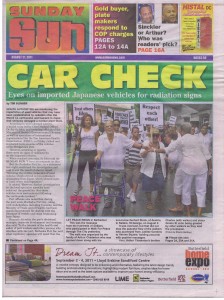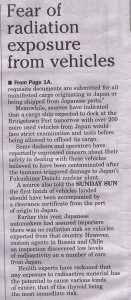One of my favourite areas in public relations is working with the media. Having worked alongside journalists for 10 years at the Nation newspaper as its communications specialist- “I get them.”
I loved to pass through the newsroom when there was a good story brewing. The discussions, the possible treatments as well as the circulation department’s excitement in the whole matter as it spelt paper sales - the news dynamic is a very enthralling and captivating one.
Journalists get really excited at a good lead. I remember one of the female journalists at the Nation carrying a sticker on her car that read ‘news hound.’ Journalists see their names on the front-page byline and their adrenalin starts pumping.
That is the nature of the beast that the corporate world faces. It is for this reason that I preach to my clients never say “no comment” when a journalist ‘comes a calling’ about a story. As a matter of fact, you should thank them for the call because it signals that they are being ethical and covering the story from all angles and it alerts the C-Suite (who is the last to know anything anyway in most cases) that something is happening.
If you are not in a position or do not have the authority to comment on a story say so in a very pleasant manner. Your comment at this time should be “I am not in possession of all the facts with regards to this matter but I will get back to you shortly.” Remember journalists are on a deadline, if you indicate that you will provide them with a comment – then make every effort to do so in a timely fashion.
Alternatively, you can direct the journalist to another person who is able to answer their queries on behalf of the organization. This might be the public relations specialist, a corporate communications officer or simply the person directly related to the issue, which the journalist is querying.
At this point you should alert the person to ensure that they are ready for the journalist with information that is relevant and factual. If not, you can bet your bottom dollar that they will work with “No Comment” and you will come over as hiding the truth from the public. Remember it is someone within your organization that gave the journalist the tip off in the first place.
(See the below article from last weekend on our client, Barbados Port Inc., working with journalist Timothy Slinger of the Nation Newspaper on the Japanese Cars Radiation piece. The initial story was page 1 of course, and the follow up page 3. We not only issued a press release to the media for the initial story but we paid a courtesy call to the journalist after the second vessel was inspected to give him the outcome and later issued a statement. We were able to avoid a potentially volatile situation by following these two important rules “Always provide a comment and followup!”


http://www.nationnews.com/articles/view/no-radiation/ - August 23rd, Nation Newspaper 'No Radiation'
Never Say "No Comment!"
One of my favourite areas in public relations is working with the media. Having worked alongside journalists for 10 years at the Nation newspaper as its communications specialist- “I get them.”
I loved to pass through the newsroom when there was a good story brewing. The discussions, the possible treatments as well as the circulation department’s excitement in the whole matter as it spelt paper sales - the news dynamic is a very enthralling and captivating one.
Journalists get really excited at a good lead. I remember one of the female journalists at the Nation carrying a sticker on her car that read ‘news hound.’ Journalists see their names on the front-page byline and their adrenalin starts pumping.
That is the nature of the beast that the corporate world faces. It is for this reason that I preach to my clients never say “no comment” when a journalist ‘comes a calling’ about a story. As a matter of fact, you should thank them for the call because it signals that they are being ethical and covering the story from all angles and it alerts the C-Suite (who is the last to know anything anyway in most cases) that something is happening.
If you are not in a position or do not have the authority to comment on a story say so in a very pleasant manner. Your comment at this time should be “I am not in possession of all the facts with regards to this matter but I will get back to you shortly.” Remember journalists are on a deadline, if you indicate that you will provide them with a comment – then make every effort to do so in a timely fashion.
Alternatively, you can direct the journalist to another person who is able to answer their queries on behalf of the organization. This might be the public relations specialist, a corporate communications officer or simply the person directly related to the issue, which the journalist is querying.
At this point you should alert the person to ensure that they are ready for the journalist with information that is relevant and factual. If not, you can bet your bottom dollar that they will work with “No Comment” and you will come over as hiding the truth from the public. Remember it is someone within your organization that gave the journalist the tip off in the first place.
(See the below article from last weekend on our client, Barbados Port Inc., working with journalist Timothy Slinger of the Nation Newspaper on the Japanese Cars Radiation piece. The initial story was page 1 of course, and the follow up page 3. We not only issued a press release to the media for the initial story but we paid a courtesy call to the journalist after the second vessel was inspected to give him the outcome and later issued a statement. We were able to avoid a potentially volatile situation by following these two important rules “Always provide a comment and followup!”
http://www.nationnews.com/articles/view/no-radiation/ - August 23rd, Nation Newspaper 'No Radiation'
Related Articles
Of Joe Paterno, Living Legends and Doing the Right Thing
I am not at all for living legends. Yes I believe in letting persons know how we feel about them when they are alive but the legend status should be reserved for the...
Seldom Semicolon
As mundane as the topic of punctuation might seem, at some point in our lives we will have to write a piece of literature. As a result, we will need to understand the...